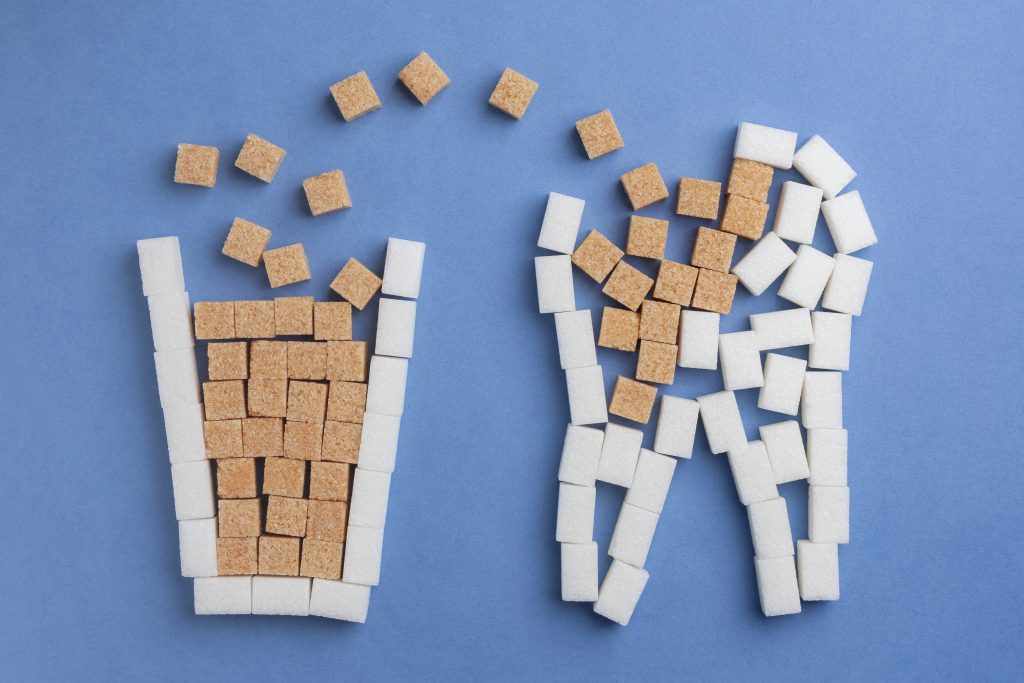
Too much sugar in our diet is one of the primary contributors to tooth decay, cavities, and other oral health issues. While sugary treats may offer some short-term deliciousness, the long-term effects on your smile can be anything but sweet.
But sugar cravings are real, and it can be hard to ignore them in favor of healthier choices. Let’s look at the reasons behind sugar cravings and explore some practical tips to manage your sweet tooth and improve your oral health along the way.
What Causes Sugar Cravings?
We all know a high sugar diet is bad for our health and our teeth. But cravings aren’t just about willpower; they often have deeper physiological or emotional roots.
Blood Sugar Imbalances
When you consume sugary snacks or drinks, your blood sugar levels spike rapidly, giving you a quick burst of energy. However, this is often followed by a dramatic crash, leaving you tired and reaching for another sugary fix to compensate—a cycle that keeps cravings coming back.
Stress and Emotional Eating
Stress and emotions play significant roles in sugar consumption. When you’re feeling sad or overwhelmed, sugar can temporarily activate feel-good chemicals in the brain, like dopamine. This is why we often turn to sweets for comfort, even when we’re not truly hungry.
Habitual Snacking Patterns
Sometimes, sugar cravings are the result of routine behaviors. For instance, if you’ve always ended lunch with a cookie or enjoyed soda during your afternoon break, your body begins to expect sugar at those times, activating cravings.
Lack of Nutrients
A diet low in proteins, healthy fats, and fiber may leave you unsatisfied, leading to frequent cravings for sweet foods that offer a quick energy boost.
Practical Tips to Reduce Sugar Cravings
Now that we’ve addressed the “why,” it’s time to tackle the “how.” Below, we’ll explore actionable strategies to nix those sugar cravings and protect your teeth in the process.
Stay Hydrated
One of the simplest yet most effective ways to curb sugar cravings is to drink more water. Dehydration can sometimes mimic hunger or cravings, tricking your brain into thinking you need sugar. The next time a craving strikes, try drinking a tall glass of water first and waiting a few minutes. Often, the craving will pass.
Eat Balanced Meals
Preventing blood sugar spikes starts with eating balanced meals that include protein, fiber, and healthy fats. For example, enjoy a salad with grilled chicken and avocado, or snack on nuts and seeds with some cheese. These nutrient-dense foods keep you full longer and reduce the likelihood of sugar crashes.
Practice Mindful Eating
Mindful eating involves paying full attention to what you’re consuming without distractions. Instead of mindlessly grabbing a candy bar or downing an entire bag of something sweet while watching TV, pause and ask yourself if you’re truly hungry or if you’re craving sugar out of habit. Slowly savoring your food can also help satisfy cravings without overindulging.
Choose Naturally Sweet Alternatives
If you’re craving something sweet, turn to fruits like berries or watermelon. These options not only satisfy your sweet tooth but also provide fiber and essential nutrients. Swap sugary sodas for flavored water or herbal teas to reduce added sugar intake further.
Keep Sugary Snacks Out of Reach
Out of sight, out of mind! If you don’t stock your pantry with cookies and candies, you’re far less likely to indulge. Instead, fill your kitchen with healthier options like fresh fruit, yogurt, or unsweetened nut butter.
Chew Sugar-Free Gum
Chewing sugar-free gum can combat cravings while protecting your teeth. Most sugar-free gum contains xylitol, a natural sweetener that helps reduce plaque and improve oral health. It gives your mouth a sweet sensation without the damaging effects of sugar.
Prepare for Stress
Since stress is a common trigger for sugar cravings, it helps to have a plan in place. Practice stress-management techniques like deep breathing, meditation, or yoga to help you unwind without relying on sweets.
Reward Yourself in Non-Food Ways
Shift your reward system! Instead of celebrating with sugary treats, consider non-food rewards like reading a new book, taking a relaxing bubble bath, or buying yourself a little gift.
Less Sugar Means a Healthier Smile
Reducing sugar intake doesn’t just boost your overall health. It can have profound effects on your teeth and gums by reducing your risk of cavities and gum disease.
Schedule a checkup today to find out more ways to improve your habits for a healthier smile.